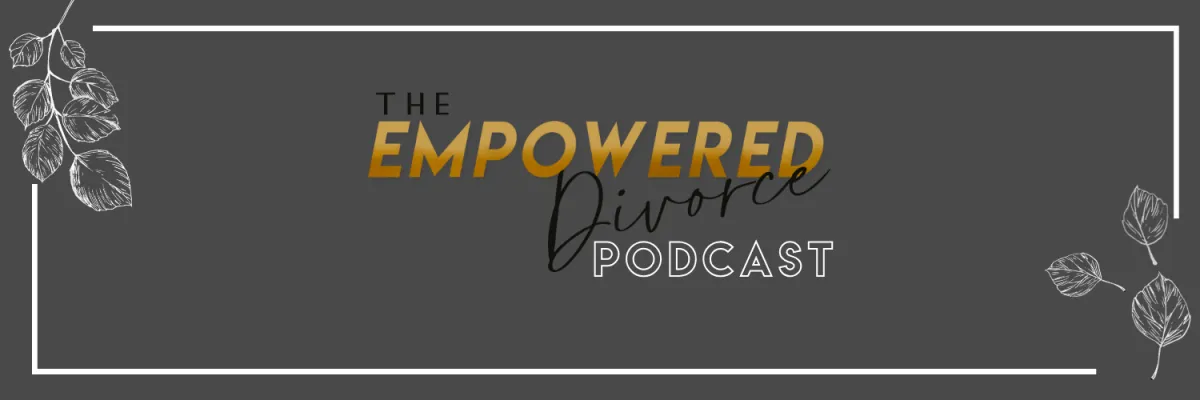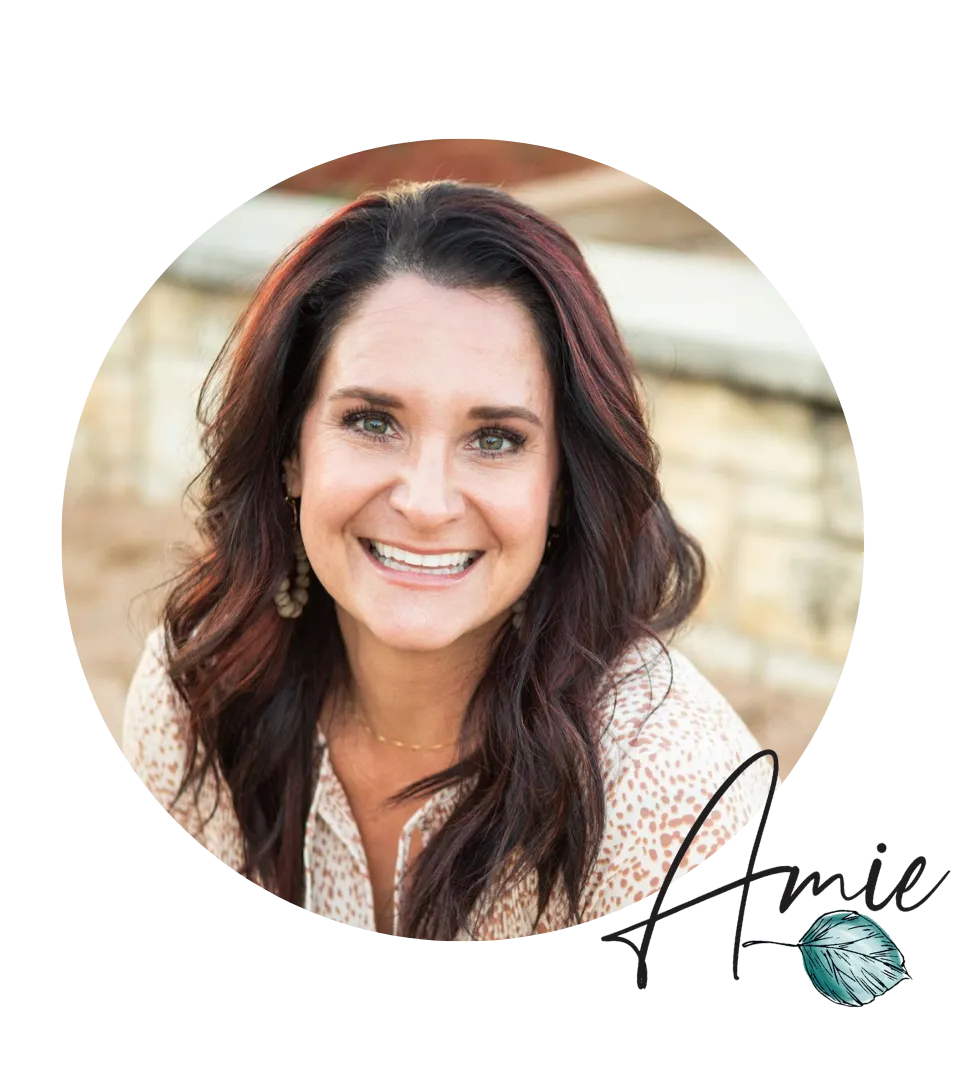
131. Was Any Of It Real? Understanding The Confusion After A Life Saving Divorce
In this episode, I tackle one of the most painful and confusing questions that often follows a life-saving divorce: Was any of it real?Was there any good? Was it all bad?
I dive into the cognitive dissonance that makes it hard to reconcile the good moments with the harmful ones, why your brain held on to the good, and how trauma clarity can bring painful but necessary revelations.
What You’ll Learn in This Episode:
📍 Reality Fragmentation: Why your brain struggles to reconcile the good with the painful truth
📍 Trauma Clarity: How gaining new language and understanding shifts your perspective
📍 Attachment and Survival: Why you clung to the good moments, and how they might not have been as safe as they seemed
📍 The Mask Is Off: Why they might seem different now, and what that actually means
📍 The Power of Acceptance: How shifting from questioning them to focusing on yourself is the key to healing
📍 Grief as a Path to Freedom: Mourning the illusion of who they were and reclaiming your own truth
Takeaways & Next Steps:
✔️ You are not crazy or alone in this experience. Your confusion is valid.
✔️ Seeing them clearly now doesn’t erase the good, but it does change its meaning.
✔️ You do not need to untangle their reality—your healing comes from reclaiming your own.
✔️ Grief is the bridge to clarity and freedom—don’t rush it, but don’t fear it either.
✔️ The good in your past relationship was created by YOU—and you can create even more goodness moving forward.
Read Full Transcript
Hello. Hello. My amazing, beautiful listeners. How are you? Thank you for joining me.
I am glad you're here. I'm glad you're listening.
I wanted to remind you and encourage those of you who have not left a review on Apple podcast. I don't know if Spotify does reviews or not either way, like, or follow it helps build the community. It helps get this podcast out to more women who are experiencing a life saving divorce, but don't know that they are, Maybe they're still comparing a life saving divorce to other divorces and feeling frustrated, unseen or unheard or confused. I know that when I had more of a language to describe what I was experiencing, the different destructive behaviors that I was experiencing, why All of the sentiments or phrases that people would tell me when I was going through divorce like, well, it takes two made me want to absolutely scream because it didn't feel true.
It didn't feel validating to my experience. and I know a lot of you have shared with me similar thoughts and feelings about that. so it's important to me and in the work that I do to separate and distinguish this kind of divorce. There are so many nuances.
There's so many aspects that surround what you all have experienced through betrayal, trauma, the abuse that accompanies betrayal. Those of you that have experienced further abusive behaviors, and destructive behaviors in the relationship. And then How that has led to a divorce. It is different. So please do me a huge favor.
Hit pause and leave that review If you aren't following, hit the follow button.
marketing says that it will help.
If you are considering joining me April 10th, 11th and 12th in Salem, Utah for the Body Awakened Brain Spotting Intensive, registration is closing in a few weeks.
This is an incredible opportunity to spend three days to help you reconnect with your body in ways that you have never done before. I can almost guarantee. I am so excited about all of the body experientials that we will be doing Along with your individual brain spotting session, we are going to dive deep into the body where trauma is stored.
Trauma is stored deep within the body.
And while our mind may be trying to process and move forward, the body can remain stuck, holding onto pain, fear and those survival responses. And for many of us, disconnecting from our body was our form of self protection to help us survive. But the longer that we have stayed disconnected, the more we experienced chronic stress, anxiety, burnout, physical conditions like autoimmune disease, chronic pain and illness.
And that's why this intensive exists to help you reconnect to your body in ways. That, like I said, you may have never done before. One of the most profound lessons that I've learned, not only from my own healing, but from supporting hundreds of women through vitriol trauma and divorce is these deep emotional wounds that your brain and body know what to heal and when.
So in all honesty, you don't need to come to this intensive with something specific to even work on. In fact, I encourage you to come to this intensive with an open mind in a neutral space. I promise what is ready to heal will be healed in this intensive.
We're essentially setting the stage for the healing to happen, I a hundred percent believe that your body and brain know what that looks like.
No one can force your healing, but we can create a space for it to happen. And that's what this intensive is all about, creating that space, the time, the right environment for your healing to unfold naturally. with three full days of deep embodied healing in a small intimate group, I'm only allowing six people daily body experientials, guided exercises designed to help you reconnect.
And trust your body again, recenter your central nervous system
and making space for that collective healing as well,
If this speaks to you, don't wait, head over to the show notes.
click the link to register and get your spot and spend three days with me and some amazing women
doing some amazing healing. In fact, today's topic on trusting yourself again goes right in line with what we are going to be doing in this intensive when it's really hard to trust our intuition, to trust our thoughts even when we are still disconnected to our bodies.
So I want to talk to you today about trust. something that I think weighs heavily on many of your hearts. it is the word It is the act of trust. It's the
belief around trust more specifically the question, will I ever be able to trust again?
And betrayal trauma absolutely diminishes that sense of trust and safety in the relationship. Maybe you've already sworn off trust completely. It absolutely would feel safer that way. You gave your trust before, you believed. In someone before, and there might be this part of you that thinks, yeah, well look at where that got you, right? Betrayed, blindsided and abandoned or rejected alone. It makes complete sense why you would not want to go anywhere near that pain again. You're protecting yourself.
Instinct is to protect.
That wisdom that your central nervous system has, your central nervous system is saying, I don't want to go through that again. And you know what? I really want to honor that part of you that is trying to keep you safe by believing that trust isn't possible or we're we're not even going to step into that again.
I also know this, that deep down. There is another part of you that wonders if trust is ever possible and wonders if a relationship in the future is possible because we are absolutely designed to connect. We're designed to connect with each other, to connect with other people. We aren't designed to be isolated.
We just look at it. Primitively speaking, isolation in the primitive days meant death. if you got kicked out of that tribe, you would most likely die. We are designed to be with people to connect.
Trying to fight or resist that inherent need can really bring on confusion when on the other side, you have this deep trust injury.
So there might be a part of you that wonders if trusting someone else is possible again, but not just trusting someone else, trusting yourself again. And that's. That's really what I want to focus on today, because the real question isn't, will I ever trust again? The real question is, can I ever trust myself again?
And maybe some of you are thinking, Look, Amy, I already did trust myself and look where it got me. I hear this all the time from women who've gone through betrayal and a life saving divorce. They say, I thought I was making a good choice. I thought I could trust my partner. I thought I was listening to my intuition and I was wrong.
And so because of that, a lot of times we start to believe that we were the problem,
maybe we're naive, maybe we're weak, maybe we're broken. Maybe we got it wrong. That something inside of us is permanently flawed, unable to recognize those red flags doomed to repeat the same mistake. But I really want you to hear me on this. You were never the problem.
You did not cause it. You could not,
you did not cause it.
What happened wasn't because you were broken or flawed or missed something. It was because someone you trusted made choices that broke trust. We have to put the responsibility and the accountability on the right side of the street. You trusted in good faith. With the information that you had at the time and when you had new information, you made new decisions.
That is not evidence of failure. In fact, that is evidence of growth. Trusting yourself again isn't about making sure that you never get hurt again. It's about learning. How to build trust in a way that actually supports you. so here's where I want to shift the focus because when we ask, will I ever trust again, who usually mean, will I ever trust someone else again?
But let's put that on hold for a minute. Before we even think about trusting someone else, we have to start with trusting ourself again.
And this might be exactly where your human brain is going to fight back or argue because
it's going to give you all of the ways in which, like I mentioned, you did trust where you thought you were making a good choice at the time. And look at where it got me.
That thought right there, that Look, I did trust, I did all the things that I thought were right and I was supposed to do and I loved and I believed he loved and all the things that your brain is telling you. That right there is where we are self betraying when we blame ourself for someone else's choices
and that belief is like a wound that just keeps on reopening, making you feel like trust isn't just being broken, it is dangerous. let's just talk about trust a little differently.
Imagine a ladder, a step ladder right now, it might feel like you're sitting at the bottom, looking up, wondering if you'll ever be able to climb up that ladder again.
Maybe it feels like all of the steps, the ladder are broken and there is no way up. I know. I felt like the ladder got yanked out from underneath me and I felt her splat all over the floor. I get why it feels that way because trust for you.
Wasn't just about. Belief in someone's words or actions, it was attachment. When your nervous system syncs up with theirs, your body finds safety in their presence, your heart making
hearts connecting, feeling at home with that person. And now that home feels burned to the ground. So rebuilding trust isn't just about deciding to decline. Right back up that ladder. That's why telling somebody who goes through something like this, we'll just get back on the horse or climb back up the ladder, right?
Just the just, it's not that simple because of the deep attachment injury. that this kind of betrayal has had on us. But we can start to climb and rebuild one step on that ladder at a time when we're focused on rebuilding the sense of trust within first, not worrying again, setting aside any idea around trusting someone else.
in fact, where this often can be problematic is
when we don't look at trust and rebuilding that for ourself first and we get into another relationship believing that this relationship is going to make us trust again or rebuild what was broken, right? Having this other person in our life. Put those ladders, put those steps in that ladder. It will never be sustainable.
It's the difference between using those wood screws, anchoring those steps in the ladder in versus tying a string around the steps of the ladder. It's going to get loose. It's going to fall.
I can't stress enough how important this work around trust has to start with you learning how to trust yourself again, and possibly for the first time. in that secure attachment way. so if we metaphorically use that first step in rebuilding the ladder, I would say the first step is learning to trust your own cues again, not blindly, not in a forced way, but in small, steady step way.
Because here's what happens when an attachment injury occurs. Like I mentioned, your central nervous system goes into survival mode and it says, never again, I will not fall for this. I will not be fooled. It mistakes vigilance. for wisdom. It mistakes fear for protection. And in the process, it stops trusting you, your gut, your signals, your intuition, your own ability to discern.
So the first step in the ladder,
listening to your body, trusting cues that your body is giving you,
not gaslighting yourself out of your own feelings. It looks like noticing when fear is speaking and asking, is this fear from the past or is it something real right now? It looks like giving yourself new attachment experiences, not necessarily romantic relationship, but in safe places where connection isn't laced with betrayal,
learning what healthy connection and interactions actually look like. Whether this. is from observing other people around you. or experiencing that with safe people in your life.
I just did a whole episode on the importance of believing your body. I cannot stress that enough, which is why I think this is and has to be that first step in the ladder, because when cognitively, we're not quite sure what really is happening present day, or if this is something that's coming up from the past.
It really doesn't matter what happened in your past is always going to in some level be part of your presence. So we have to just believe our body first. I will oftentimes have clients come who are in a committed relationships or even remarried they are struggling with, with this right here.
Trust trusting again, where they might. Be feeling like trust is violated or they're nervous about trusting something happened and they're freaking out because they, because part of them is worried about whether or not they can trust this person that they're with their partner. and I will hear consistently across the board.
My clients say, well, I'm not quite sure where that line is right. where do I validate what I'm feeling or what's coming up, But not letting my past dictate the present, or not bringing what happened to me in my past relationship into my current relationship, and I have to say, over and over, unfortunately, this is the consequence of trauma, is that that trauma part will always be with you.
As long as you're having this human experience, so there is no line, there is no drawing that line from our past to the present, that part of you that knows about betrayal, that part of you that knows about being deceived, about being lied to, about the trust and relationship attachment injury will be with you always to warn you now.
Here's where healing comes in and why practicing these kinds of tools help because that level of activation won't be as intense and when we Accept this this really comes down to that radical acceptance when we accept that this is Part of our human experience and will be part of our future relationships that acceptance allows us to see The reality of today, a lot more clearly, and dare I say faster, for example,
when issues like this come up for me in my current relationship, when I'm making space and honestly normalizing and just validating, you know what? I don't believe you, or I'm having a really hard time trusting what you just said right now. First of all, it helps that my partner does not make that mean anything about him.
He does not get defensive. he does not avoid me or push me away or discount what I am saying in that moment. He allows me to take up space and to have feelings. And he's there because he doesn't have anything to hide. And he is trustworthy. He can allow me to be in my space with this idea that, you know what?
I don't know if I trust you right now. This is secure attachment. He is secure within himself and how he is living his life. So there is no need to be defensive or take it personally. He knows. This trauma part is part of my human experience now. when I noticed this come up for myself, I'm not belittling myself.
I'm not judging myself. I'm not discounting what's coming up. I'm not mad at myself that this is coming up again. What happens? Is that I notice it, I validate it, I'm asking more questions to get more clarity. because I'm not arguing with this part anymore, I know that this is a part of me and my human experience.
I can see the truth of the reality quicker,
The more I practice this, the more I hold on to radically accepting that this is part of my experience. I'm not hung up. And the reason why it's faster is because what slow, what can slow me down and has slowed me down in the past is I'm Arguing against that reality.
I'm mad that this is happening. I'm wondering why am I still here? What am I doing wrong? What can I heal more or faster or quicker? This shouldn't be happening, right? All of those thoughts. This is what's slowing it down, but slowing down my ability to see things as they really are. I know I kind of just went off on a tangent there, but I cannot stress enough how often I see this happens, this come up even with those that get into a different relationship.
So that's why. Believing your body first, whether you're in a relationship or not, or whether you swear you're never going to get in a relationship or not, we still need to trust our own body cues first. That's the first step in that ladder of rebuilding trust with yourself.
Okay. The second step is rebuilding inner safety. Self trust isn't about never making a mistake again or never choosing wrong again. And I know, I know a lot of you who come to me or do the dating from within workshop, we really just want to figure out how to get it all right so that we don't get it wrong again.
And one of the things that I'll say to those that show up in my dating workshop is that, You didn't get it wrong the first time part of trusting ourself again is radically believing this as well because you did, you made the decision, you made the choices that you did with what you knew at the time.
We cannot, it is just mean, it's just downright mean and rude to judge our past self, to judge our past. knowing and information that we had at the time, with what we know today. So you got it right with what you knew at the time, and you can't do that hindsight 2020 look back and regret It's just, it's just mean to do to yourself.
So stop being mean to yourself if you're doing that, which is why trust isn't about never making that mistake again. It is about knowing that no matter what happens, You will have your own back.
One of the ways that I started practicing this for me early in my recovery, one of my coaches gave this to me and I loved it ever since because I didn't quite trust myself and I didn't quite believe that I had my back. So to cultivate this belief, I played around with the idea of, all right, well, if I did believe that I have my own back, if I did believe that I could trust myself, then What would I do or what would I think about this particular situation or whatever?
Right? But I liked framing it that way. It's what I, that's what we call a bridge thought when we're not quite ready to believe that we can trust ourselves. We bridge that gap of doubt with, well, if I could believe that I have my own back, if something happens again, then. What would that mean? Or what would I do in this situation?
If you believed that no matter what happens, you have your own back,
what would you see yourself feeling or doing?
Rebuilding your own inner safety means learning how to recognize when your body says yes, And when it says no, listening to it, it means pausing when something doesn't feel right. Instead of rushing to explain it away or self doubt, maybe I'm just being too much or too picky or too extreme or too whatever, or not enough.
It's about creating internal safety so that you know, I can trust myself and listen. I like starting my clients with some, with. Things that they can do to rebuild this inner safety and this inner trust with things that maybe aren't so emotionally charged, like around a relationship or other people that might look like setting a bedtime, setting a bedtime routine, uh, waking up at a certain time, maybe starting an exercise routine, something that isn't, like I said, so emotionally charged.
So if I say, you know what, I need to be in bed by 10 o'clock every night, I'm going to create that goal. I know this is what my body needs. I know this is what my mental health needs. I can rebuild that inner safety by knowing that I will have my own back around 10 o'clock when I need to go to bed and other people are trying to get me to stay up.
I'm going to trust myself that I will honor and listen to what my body is telling me. I need to go to bed. When we do that over and over on some of these smaller emotionally skilled experiences, we can start to rebuild that inner safety. Okay. The next step in that ladder, I think in terms of rebuilding a sense of self trust
is small proof over big promises. What I mean by that is a lot of people think trust is built by making this big, huge leap, like Getting into another relationship, trust isn't about jumping. It's about stacking small moments of proof. When I have my couples who are trying to stay in the relationship, work and heal and the one that betrayed is trying to rebuild trust.
This is one of the things that we have to be very, very, very clear about is that you, my betrayer are not going to expect your partner to trust you again in one big leap. This is absolutely going to take consistency, small steps over a long period of time.
Anytime that expectation is you should trust be my, by now, I've been good for a month or I've been good for three months. I will just shut that down so quick because that is not how trust is rebuilt after this kind of injury. with the partner that injured, it also is not rebuilt within yourself in one big leap.
It's still going to take consistency over time.
So for example, like I mentioned last time, can you trust yourself to rest when you're tired? Can you trust yourself to say no when something doesn't feel right? Can you trust yourself to take up space without apologizing? Each one of these choices. is another step on that ladder.
Okay. Another step, trusting your healing process, trusting yourself doesn't mean you're never going to feel fear. You're never going to feel doubt. You're never going to feel pain or hurt. It means trusting that when those feelings and experiences come up, they don't drown you. They don't ruin you. And they don't define you that you don't have to have.
Every answer today, healing isn't about reaching some final destination where everything is perfect and fine and happy and rainbows and butterflies.
Sometimes we try to protect ourself and wall off and get on this island and build barricades and barricades around the island to protect from pain, to protect from those feelings. And it just. isn't possible. Certainly not long term. You might be getting some relief from that, from those of you who are building up all of those barriers, but Ultimately, like I said, in the very beginning of today's episode, we're made for connection.
Real healthy living is not living on our island with all of the barricades. Trust your healing process and part of the healing process is leaning in, leaning in to connection, leaning into vulnerability,
trusting that you're capable of navigating whatever does come next. That's why this one comes after what I said before, as you practice believing that you've got your own back, believing that you can trust you, that if other people with which we cannot control, we cannot predict,
make choices that we feel hurt over, that we can feel hurt and that we can protect ourself from further hurt.
The next step to rebuilding a sense of self-trust is trusting selectively but not blindly. So again, trusting again does not mean handing over your heart to just anyone means knowing that you get to decide who earns access to you. That is not being, that's not bitchy, that's not mean, that's not bully, that's not selfish.
Whatever narrative. Whatever perspective your brain is offering you about that, it's not. This is actually healthy. This is actually secure. This is appropriate. We get to choose who we give keys to that access. If you're the house, again, metaphor, another metaphor, if you're the house, you are not expected to leave all the doors and windows and garage open so that anybody can just walk in any time.
Your job is to protect everything inside your house. it is okay to lock it up and then choose who you give the key to, who you give the code to. You get to decide that. I will say this. if we're talking about a relationship, you also get to decide who you get to be in a relationship with and how much access they get to you, especially when you're creating that new trust building relationship.
It means knowing that trust isn't about proving your worth to someone else. It's not having those doors and windows and garage open saying, see, look at all the valuable things that I have inside. Don't you want to come in? See how good I am?
It's not trying to prove to anybody staying outside that house, standing outside that gate, that you're worth something if they come in. Trust built from within first is proving to yourself that you can discern who is safe and who is not. You don't have to jump to the top of the ladder. You just have to take it one step at a time.
And maybe right now that step is simply letting yourself believe that trust is still possible. Not because someone else deserves it, but because you deserve to live a life where fear doesn't make every decision for you. fear is one of those steps in the ladder, it will eventually break. Fear is not sustainable.
Fear is not meant to be sustainable. Fear is information so that we can take that information and further protect if we're putting fear in the ladder as a way to prevent future hurt or pain, it will always break.
Step in the ladder will always break because you can't predict that you couldn't have predicted it to begin with. I know many of you might still be grappling with that idea. Many of your brains are still trying to figure out how you could have prevented this kind of pain, this kind of betrayal, this kind of injury, and it's just not possible unless you are one of those uniquely gifted people that can see into the future, which I've never met one.
But those of us with normal human brains. It's not possible beating yourself up over it is just mean it's not helpful. It's not useful. It keeps you stuck. It keeps you limited and it keeps you from trusting yourself. if we ever want to have and cultivate healthy connection in the future, whenever that is, we must start cultivating healthy trust within first.
So, if you're at the bottom of that ladder, staring up, wondering if trust will ever feel safe again, just know this, you don't have to do it all today. you don't have to force yourself to believe in something that you're not ready for either. Just take that next step.
Trust isn't a leap. It's a climb. Every step that you make. Up that ladder, no matter how small, it is going to bring you closer to yourself again.
Your intuition wasn't wrong. Your circumstances were deceptive. So if you're feeling like you should have known, the reality is the abusive behavior and communication that hid the acting out behaviors, the betrayed from the betraying partner. Manipulated that trust, created an environment that fostered self doubt.
And so the fact that you trusted someone who turned out to be deceptive does not mean your ability to trust yourself is broken. Please know that. It means someone exploited your trust. You weren't foolish. You were operating in good faith, which is what we do with our primary attachment person.
Listen to your body, honor your boundaries, and validate your emotions.
You were never broken. You were wounded. You can trust yourself again. One small step at a time. Because you can. Take care, everybody.







Facebook
Instagram
Youtube